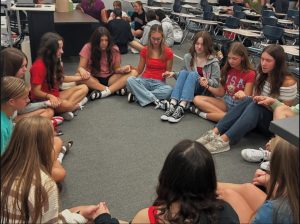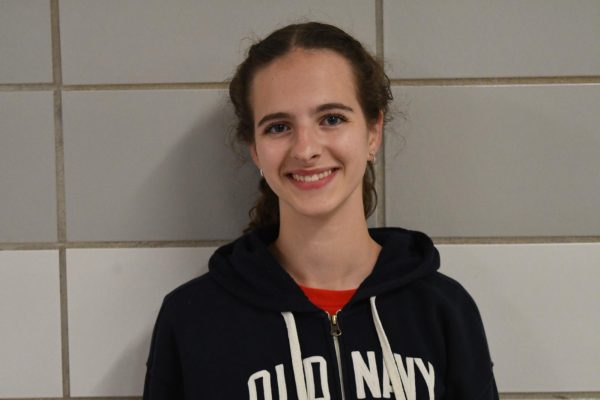Students lack input in the school budget
screenshot from the District211 YouTube channel
At the January 20th board meeting, District 211 board begins discussions on budget forecast for 2022.
January 27, 2022
Student conversations could be the pinnacle to revealing what the school population needs from something that should be working for their benefit: the school budget. Students need to feel more a part of the school’s decision making processes, especially when it comes to clubs and activities, and that all starts with the budgeting process done at Palatine High School.
“Questions haven’t really been asked about the budget before,” a former administrator and current Palatine High School educator said. “The [Administration] wants to give the impression that they listen to teachers or students, but mostly they believe they know best.”
Currently, student opinions are filtered through their club sponsors, coaches, and teachers. It is important for students to have a voice, as those who could be helped the most feel the most misrepresented.
“We have in recent years developed a greater interest in competitive dance, where we’re now running both the varsity and a JV level,” said assistant principal Kim Glaser. “So in the last fiscal budget, I didn’t have anything budgeted for a JV poms. So this year, that became part of my thought process.”
The greater interest in poms led to more attention from administrators. But for similar clubs, like the school’s non competition team Orchesis, they seem less on the mind of administration.
“You’re not seeing it when they’re planning the budgets…even if you’re appreciated by the school,” junior orchesis member Hala Habahbeh said. “You’re not appreciated enough to be seen when they’re calculating what everyone needs, and I understand the need for fundraising, but some of us have to fundraise much harder than others just to receive the bare minimum.”
Orchesis members have to buy most of the mandatory clothing on their own. Financial help is sometimes provided, but it never fully covers the cost. Poms uniforms are reused throughout the years, but paid for by the school. Administration has mentioned that anything necessary to run a program should be covered by the school budget, so why does Orchesis have to buy these things on their own? Similarly, the girl’s soccer team has had to share their uniforms with the boy’s team for the past two years.
Even if some clubs feel the effects of these budget compromises, the problem still seems to run deeper. All clubs should feel like their administration can be a reliable supporter for them, no matter the size, and the best way to do this is to make sure that students feel they can advocate for resources to be allocated to them.
Students are at the focal point of every decision made at the administrative table, but they have limited means to get their own point of view across. When you look at the fact that student motivation is at an all time low due to the pandemic, making students feel heard about the things they are passionate about, the things they choose to stay after school for, could be the key to bringing them back to their fullest potential.
“[Students should] speak to the administrator or go to the board meetings,” Palatine High School athletic director Luis Arroyo said. “I think if they have any questions about…having needs, they should be talking to their administrator or coaches.”
The issue right now is that students don’t have a chance to build their case, or bargain further. It’s all done through the hands of coaches or administrators, who might not always be able to communicate the needs of students effectively.
There needs to be more sway from the bottom up regarding the school budget. Teachers are not even involved as much as they should be.
“Most teachers are not involved,” the educator said. “Teachers in departments where lots of things are purchased…are probably more familiar with the process, but just from a supply standpoint. If I hadn’t worked as an administrator previously, I would not know much about the budget process.”
The goal of administration is to allocate resources and funds for the benefit of its students. Teachers and students know on a very practical level how the budget could be best tailored to suit them. The job of administration should be to take these accounts and make them a reality through their formal means, as opposed to making decisions from merely a top-down view.
“I feel like whenever students have a big, complicated issue that they want to talk about…administration might…try to open up their spaces to talk about this kind of issue,” Back of the Yards High school senior Mateo Curiel said. “But then it comes to the point of…what are we going to do about this issue?”
Back of the Yards high school social studies teacher Jackson Potter created a stimulus budget curriculum with other teachers in the Chicago Teachers union to educate students about the school budget. Curiel and other students lead this movement, and all the students in the program had a chance to submit reports on what they thought the extra 2.3 billion dollars in relief funds should be used for.
These students eventually spoke to the school board, and faced similar barriers in communication that students at PHS feel there are.
“A lot of the issues came from not really having as much contact with them as we would have liked, it’s hard to get in touch with the board,” Curiel said. “When we have a limited time with them, or if we are unable to get everything with just one meeting.”
The communication between administration and students needs to be more streamlined. Administrators do care about the students they are intended to serve, but how could they possibly understand the day to day issues if there is no efficient communication between the two?
“I would say that they were receptive and that they made sure to take notes,” Curiel said. “I feel like that was a huge success for us to get them talking to get them to discuss.”
When students put their voices out there, simply getting a willing listener should not be something extraordinary. These things need to be commonplace for students. These students felt empowered because they felt as though they were able to make informed decisions about things that would impact them and their peers, all by simply being able to talk to their local school board. Holistically speaking, a solution would need students to feel informed about the way their school runs and feel heard when they have something to say about it.
“If there’s ways that we can continue to increase students’ connection to those experiences through budgeting…that’s something that I would be open to exploring with sponsors,” Glaser said. “I think that is something that myself and Mr.Arroyo could explore formalizing even a little bit more than what we have right now.”
If students have an easier way of feeling informed and heard regarding influential processes like the school budget, they will feel like they belong at Palatine. The daily conversations between frustrated peers and teachers could hold the simple solutions for a happier, more efficient, school system.
“So my advice to students would be to really put your voice out there, even if you don’t think that it would make a difference,” Curiel said. “Take to social media, talk to your friends, anything that would really spread the word about what our students are doing.”
Curiel recommended everything from joining extracurriculars to speaking with local representatives about the issues you feel passionate about. More specifically at PHS, students should be open to conversations with administrators about day to day issues. Increasing transparency between administration and students and staff will lessen the disconnect between them, and make Palatine feel more like a student centered community.
“Really, like put yourself out there…that’s very hard for the administration, or anyone to ignore,” Curiel said.








